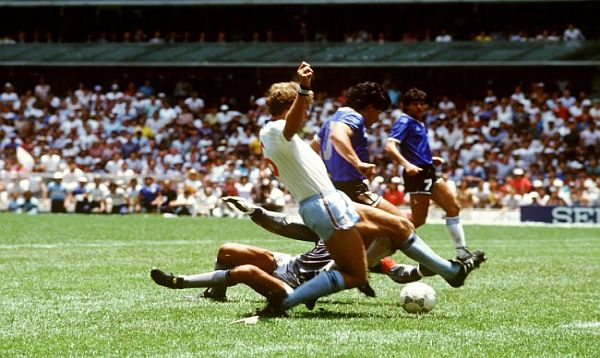"The truth is that I don't regret for a second scoring that goal with my hand." With these words revealed in 2005, Diego Maradona confirmed that he had used his hand to score a goal in a game between Argentina and England. The illegal action helped his national team advance to the semi-final stage and eventually win the World Cup in 1986.
Wounds of the Falkland War of 1982 between Argentina and Great Britain were still fresh in 1986 and the soccer game between the two countries took on a symbolic meaning. A few days before the game, a headline in an English paper stated very realistically "Si, Seņor, It's War."
It was just a game, of course, but for the Argentines it certainly went far beyond sports. Winning became an opportunity to stick it to the English even through illegal means, although Maradona at the time credited the "hand of God," for scoring the goal.
The final stages of this year's World Cup are being played in Russia and both England and Argentina are part of the 32 finalists. The two countries are in different groups but, assuming that both advance, there is a chance they could meet again for a 1986 rematch.
It would not be the only game in which nationalistic feelings would emerge on the soccer field, as history tells us. When two countries meet in the World Cup it's not just a game since national pride is at stake that goes far beyond the soccer field. In 1966, when England beat Germany in the final game to win the World Cup, many English fans saw a repeat of their win in World War II.
In 1988, when Holland defeated Germany in the European championship, delirious Dutch fans threw their bicycles up in the air and shouted that they had got their "bikes back," a reference to World War II, when the Nazis had confiscated all the bikes in Holland.
In 1998 the Iranian national team beat the US counterpart in France. Iranians poured into Tehran streets to celebrate their victory. Neither team eventually won the World Cup but even beating an historical "enemy" in a single game made the Ayatollah Ali Khamenei state that the players had made their nation happy. It was a way of paying back the "Great Satan" for the American support of the Shah and Iraq during their war.
Many of the countries in the final 32 don't have much of a chance to win the World Cup. Yet, even advancing to the quarter finals and in exceptional cases the semi-final stage would be a great victory. In some cases, even beating one of the perennial candidates to the final victory, such as Brazil, Germany, Spain, France, Argentina, and a few others, is the equivalent to winning the final trophy.
Losing to a "small" country can also be a national disaster. In 1966, North Korean players became heroes in their country when they defeated their Italian counterparts. Italian players, on the other hand, were greeted back home by fans who threw lemons at them. A disaster Italian players repeated in this year's Cup in which they failed to qualify for the final stages.
Sadly, soccer fever engenders enthusiasm in many countries which political leaders exploit for their purposes. Just winning a game against one of these rich countries suggests to a poor or small country, lacking a winning tradition in soccer, that although they may not equal the major soccer power -economically, politically, or in other ways, they can compete in one area. And for a moment they feel they are better than the defeated country, not just in soccer, but in every other aspect of life.
It's not true, of course, but soccer fever is very strong because it is the world sport, something Americans can only understand if we add the popularity of American football, baseball, baseball, and hockey. And the victory on the soccer field boosts the national ego. It's a beginning for positive change in their lives.
It's difficult to predict who will take home the World Cup trophy this year. One country, though, has already won. As the host country, Russia will be the focus not only of significant media attention, but of political legitimacy as well. Although the United States, the European Union, and a number of other countries imposed sanctions on Russia after it took control of Crimea in 2014, FIFA did not follow suit and retained it as the host country. Vladimir Putin, by hosting the games, already won.
Domenico Maceri, PhD, is emeritus professor of romance languages at Allan Hancock College, Santa Maria, California. He is the author of a book on Pirandello, one on Spanish grammar, and another on Italian grammar. He has also published a number of articles in newspapers and magazines around the world, some of which have won awards from the National Association of Hispanic Publications.Click HERE for more articles by Domenico Maceri.



